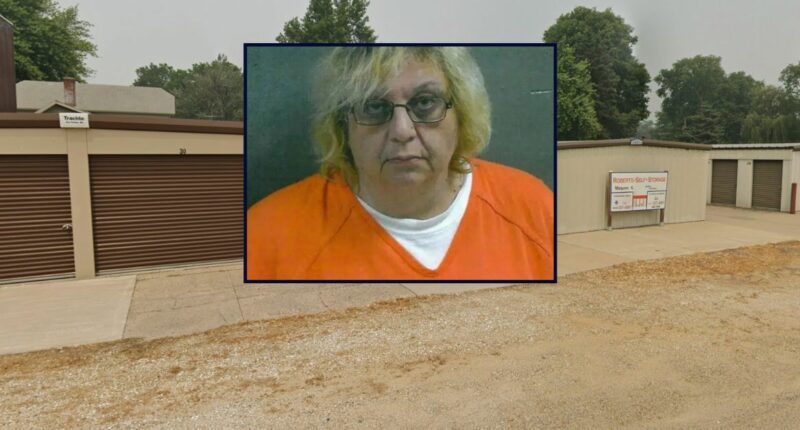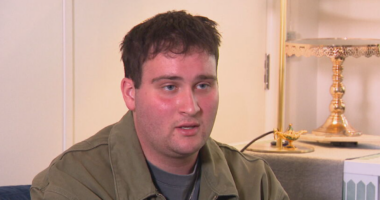Share this @internewscast.com
Inset: Marcy Oglesby (Knox County Jail). Background: The self-storage center where Oglesby hid her slain boyfriend’s body in Maquon, Ill. (Google Maps).
An Illinois woman has been sentenced to a lengthy prison term following her conviction for the murder of a former police chief and her longtime lover.
Marcy L. Oglesby, aged 53, was found guilty in late June during a bench trial in Knox County. She faced charges of first-degree murder, attempted first-degree murder, and aggravated battery.
On Monday, Knox County Circuit Judge Andrew Doyle handed down a 50-year prison sentence to Oglesby, who will serve her time in the Illinois Department of Corrections. The judge also acknowledged the 326 days Oglesby had already spent in custody before the trial.
This sentencing concludes a dramatic legal saga following the death of Richard “Rick” Young, a former chief of the Maquon Police Department, who was killed by Oglesby in the fall of 2021.
“She took the life of a man who loved and cared for her for nearly three decades,” Knox County State’s Attorney Ashley Worby remarked during the sentencing. According to NBC affiliate KWQC, Worby added, “She poisoned him and watched him suffer.”
Young’s body was discovered on October 7, 2022, in a storage unit rented by Oglesby at Roberts Self-Storage in Maquon. This small village is located about 60 miles south of the Quad Cities, a metropolitan area straddling Illinois and Iowa.
But the conviction and lengthy sentence were not a foregone conclusion; several aspects of the case suggested the opposite.
Police say that at the time of Oglesby’s arrest, prosecutors only filed charges of concealment of a non-homicidal death. Later, in February 2023, came the upgraded charges for which she was convicted.
In March 2023, Oglesby’s defense attorney filed a motion to dismiss the more severe charges under the state’s speedy trial law.
Then, in April 2023, the more severe charges were dropped.
Next, in November 2023, prosecutors refiled the more severe charges, after telling a court during a motions hearing they did not, at first, believe they had sufficient evidence to secure a conviction.
According to Knox County Sheriff’s Office Detective Gregory Jennings, Karen Doubet, who lived with the couple, was initially “deceptive” about the body in the storage unit. Eventually, Doubet said Oglesby had poisoned Young’s food and beverages “with eye drops and some crushed medication” over the course of the past year.
“Prior to interviewing Doubet, Jennings was unaware someone could be poisoned by eye drops,” the Fourth District Appellate Court noted in an 18-page order reinstating the charges. “Jennings testified he attended the preliminary autopsy on Oct. 10, 2022, which provided no conclusions as to the cause of death and found no antemortem fractures.”
Oglesby, on the other hand, allegedly claimed that Young died after a bout with COVID-19. She later admitted to keeping Young’s body in the storage unit because, she said, his last wish was to be buried in an “Indian burial mound,” and she did not know how to accommodate that request, according to Knox County Sheriff’s Office Detective Jeremy Moore, who also testified at the motions hearing.
Moore testified that a December 2022 toxicology report found tetrahydrozoline in Young’s body, which, he said, was “one of the ingredients in most typical over-the-counter eye drops.”
Moore also conducted a follow-up interview with Doubet, he testified, during which she admitted to buying multiple bottles of eye drops that Oglesby allegedly put into Young’s food and drinks.
During this confession, Doubet allegedly told law enforcement she and the defendant wanted Young out of the house, but he would not leave. A search warrant was then executed at the shared residence in January 2023. There, Moore said, law enforcement found “a copious amount” of discarded eye drop bottles, a pill crusher, packaging for the pill crusher, and “a receipt that showed the purchase of some eye drops from a Dollar General.”
Taking all of the testimony into consideration, Doyle dropped the later charges against the defendant, finding “the state did have sufficient evidence to give them a reasonable chance to secure a conviction” and that those charges all arose from the same act, therefore mandating compulsory joinder. Doyle also found Oglesby had actually been placed in custody on Oct. 7, 2022, when police took her to the hospital before her formal arrest, and that the newer charges were filed well after the 120-day speedy trial timeline. Because the charges should have all been filed at the same time, the later charges were dismissed, the trial court judge ruled.
On appeal, however, the higher court determined that the murder and moving of the body were not the same criminal act at all.
“Prosecution for concealing a death is restricted to situations where the body itself is hidden, such as performing some act other than merely withholding knowledge or failing to disclose information in order to prevent or delay the discovery of a death by nonhomicidal means,” the order reads. “This is substantively different from the crimes…charged here, which require the administration of a poisonous or controlled substance, physical harm, death, and a substantial step toward the commission of the offense.”
Oglesby’s defense opted to avoid a jury, perhaps in the hope Doyle would exhibit similar sympathies to the since-condemned woman.
Whatever the calculus, however, the judge found the woman guilty after five minutes of deliberation, following a four-day trial, according to Peoria-based CBS affiliate WMBD.
According to the state, the regime of eye drops began in the summer of 2021 and concluded sometime around early November that year.
This week, the defendant was defiant – maintaining her innocence.
“My allocution today will have to take a slightly different path because I respectfully disagree with the court’s findings, and I will not be referencing a murder that did not happen,” Oglesby said. “He didn’t go into that box immediately. I put him back to bed and continued to talk to him for three days.”
















